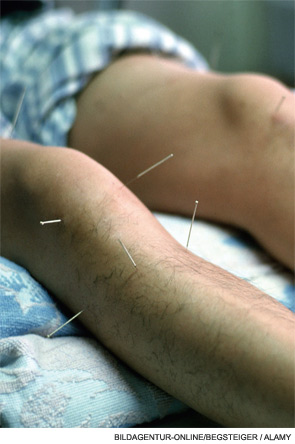
Knee Pain
Acupuncture Seems Effective in Treating Chronic Knee Pain
By Gail C. Davis, RN, EdD
White A, Foster NE, Cummings M, Barlas P. Acupuncture treatment for chronic knee pain: a systematic review. Rheum. 2007;46:384-390.
Abstract
Objectives: To evaluate the effects of acupuncture on pain and function in patients with chronic knee pain.
Methods: Systematic review and meta-analysis of randomized controlled trials (RCTs) of adequate acupuncture. Computerized databases and reference lists of articles were searched in June 2006. Studies were selected in which adults with chronic knee pain or osteoarthritis of the knee were randomized to receive either acupuncture treatment or a control consisting of sham (placebo) acupuncture, other sham treatments, no additional intervention (usual care), or an active intervention. The main outcome measures were short-term pain and function, and study validity was assessed using a modification of a previously published instrument.
Results: Thirteen RCTs were included, of which eight used adequate acupuncture and provided Western Ontario and McMaster Universities Osteoarthritis Index (WOMAC) outcomes, so were combined in meta-analyses. Six of these had validity scores of more than 50%. Combining five studies in 1,334 patients, acupuncture was superior to sham acupuncture for both pain (weighted mean difference in WOMAC pain subscale score=2.0, 95% confidence interval [CI] of 0.57–3.40) and for WOMAC function subscale (4.32, 0.60–8.05). The differences were still significant at long-term follow up. Acupuncture was also significantly superior to no additional intervention. There were insufficient studies to compare acupuncture with other sham or active interventions.
Conclusions: Acupuncture that meets criteria for adequate treatment is significantly superior to sham acupuncture and to no additional intervention in improving pain and function in patients with chronic knee pain. Due to the heterogeneity in the results, however, further research is required to confirm these findings and provide more information on long-term effects.
Commentary
Knee pain (accompanied by interference with function) is a common problem in the general population, and its prevalence increases with age. Acupuncture as a form of sensory stimulation has become increasingly popular as a form of treatment, especially for individuals who experience drug-related problems. In this study, White et al. conducted a systematic review and meta-analysis to evaluate the effects of acupuncture on pain and function in patients with chronic knee pain. Acupuncture was defined as “adequate” for this study if it “consisted of at least six treatments, at least one per week, with at least four points needled for each painful knee for at least 20 min, and either needle sensation (de qi) achieved in manual acupuncture, or electrical stimulation of sufficient intensity to produce more than minimal sensation.”

